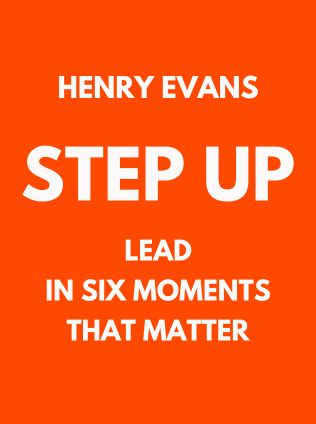
Step Up
Lead in Six Moments that Matter
By Henry Evans
Published 04/2014
About the Author
Henry Evans is the founder and managing partner for Dynamic Results, LLC, specializing in strategy execution, executive development, and emotionally intelligent leadership. His best-selling book, Winning with Accountability, was published in 2008. Colm Foster specializes in working with executives and their teams to improve individual and team effectiveness. Foster conducted much of the research used in the book Step Up.
Main Idea
Step Up: Lead in Six Moments That Matter by Henry Evans and Colm Foster emphasizes that leadership is not confined to titles or positions but is about actions taken during critical moments. The book identifies six key leadership moments where anyone can step up, make a difference, and drive positive change within an organization. By recognizing and seizing these moments, individuals can enhance their personal impact, effectiveness, and ultimately, the success of their organization.
Table of Contents
- Introduction
- Get Angry, Not Stupid
- Avoid Terminal Politeness
- Decide Already
- Act When You Are the Problem
- Leverage Pessimism
- Create Emotional Safety
Introduction
The introduction outlines the six critical leadership moments: using anger intelligently, avoiding terminal politeness, making decisions, taking ownership, leveraging pessimism, and reversing negative interactions. The authors argue that recognizing and acting in these moments can transform ordinary individuals into impactful leaders. They emphasize that leadership is about actions, not titles, and that anyone can step up and lead when the situation demands it.
Get Angry, Not Stupid
Evans and Foster discuss how anger, often seen as a negative emotion, can be leveraged constructively if managed properly. Anger can provide the emotional fuel needed to drive action and change. The key is to stay intelligent while angry and avoid reacting impulsively. By recognizing triggers and employing techniques like deep breathing and questioning, individuals can channel their anger into productive responses.
"Anger is a good example of an afflictive emotion that is highly leverageable." - Henry Evans
Anger, when used correctly, can be a powerful tool in leadership. The authors highlight that anger is not inherently bad; it is the mismanagement of anger that leads to negative outcomes. The key is to harness the energy anger provides and direct it towards constructive action. For instance, Alexis Ohanian, co-founder of Reddit, used his anger at being dismissed by a Yahoo executive to fuel his determination to prove the value of his company. This anger, managed wisely, can drive individuals to achieve outstanding results.
leveraging anger intelligently:
- Using frustration as motivation to improve performance.
- Redirecting anger into problem-solving efforts.
- Channeling anger to drive team focus and energy during critical projects.
The authors emphasize the importance of responding rather than reacting to anger. A reaction is often thoughtless and impulsive, whereas a response is planned and thoughtful. By identifying personal triggers and learning to recognize the physical signs of anger, individuals can intervene before their emotions take control. Techniques such as deep breathing, questioning, and adopting a 'palms up' posture can help maintain composure and intelligence during heated moments.
Sign up for FREE and get access to 1,400+ books summaries.
You May Also Like
The Subtle Art of Not Giving a F*ck
A Counterintuitive Approach to Living a Good Life
By Mark MansonRich Dad Poor Dad
What the Rich Teach Their Kids About Money - That the Poor and Middle Class Do Not!
By Robert T. KiyosakiHow To Win Friends and Influence People
The All-Time Classic Manual Of People Skills
By Dale CarnegieQuiet: The Power of Introverts
The Power of Introverts in a World That Can't Stop Talking
By Susan Cain



















